#Schelling
Text
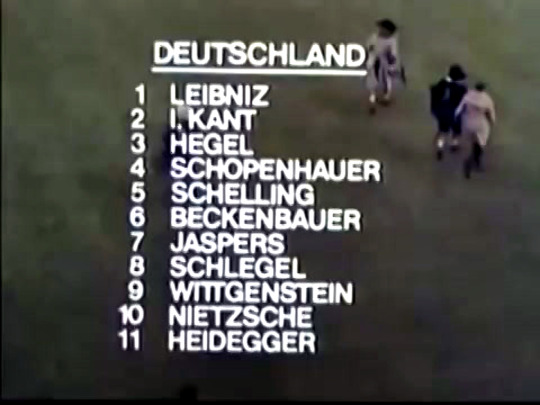
#deutschland#leibniz#kant#hegel#schopenauer#schelling#beckenbauer#jaspers#schlegel#wittgenstein#nietzsche#heidegger#monty python
66 notes
·
View notes
Quote
Schelling's philosophy — which might be termed criticized mysticism — concludes like Aeschylus's Prometheus in earthquake and ruins.
Friedrich Schlegel, Athenaeum Fragments
26 notes
·
View notes
Text

triff mich und die boys wie wir im sogenannten unsinnskollegium abhängen wie wilde schelmen
#hab mir gesagt dass ich nicht schlafen gehe bevor ich diesen aufsatz nicht fertig hab#läuft gut bis jetzt#ich bin auch so ein 1-mann-unsinnskollegium ;-)#hegel#schelling
8 notes
·
View notes
Text
The reaction of Goethe, Schelling and Hegel immediately after the defeat of Napoleon:
These were all written following the news of Napoleon’s defeat at the Battle of Leipzig (1813), the largest battle in European history before the World Wars.
From Goethe, a German supporter of Napoleon:
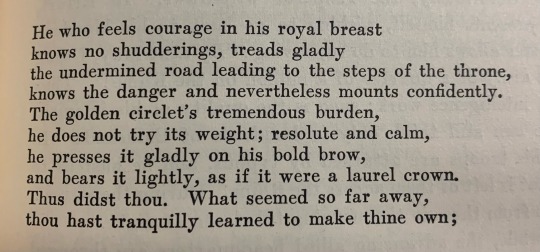

From Schelling, a German supporter of Napoleon:

From Hegel, a German supporter of Napoleon:

Source: Napoleon, by Emil Ludwig
#Goethe#Schelling#Hegel#napoleon#quotes#book#book pics#napoleonic era#napoleonic#first french empire#19th century#french empire#Germany#history#french revolution#napoleon bonaparte#france#Leipzig
32 notes
·
View notes
Text
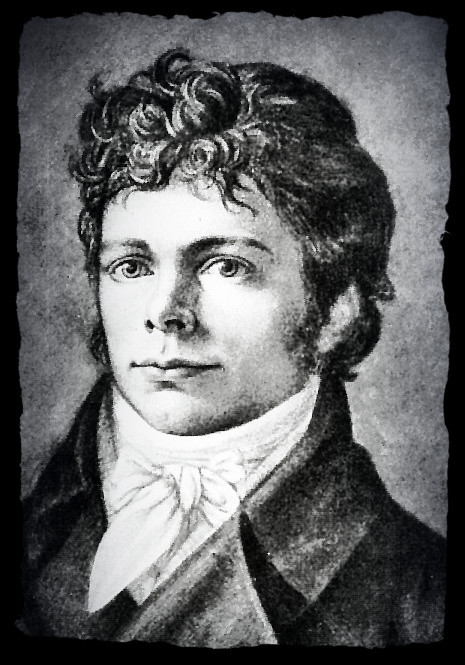
«En resumen, aquel que vive en su ciencia solamente como en una propiedad extraña, aquel que no la posee verdaderamente, que no ha recabado un órgano seguro para ella, que no puede en cada momento crear algo nuevo partiendo de ella, es un indigno, que ya en el intento de transmitir los pensamientos del mundo antiguo y presente de forma simplemente histórica, sobrepasa sus fronteras y se hace cargo de algo que no puede llevar a cabo.»
F. W. Joseph von Schelling: Lecciones sobre el método de los estudios académicos. Editora Nacional, pág. 83. Madrid, 1984.
TGO
@bocadosdefilosofia
@dias-de-la-ira-1
#schelling#friedrich wilhelm joseph von schelling#f. w. Joseph schelling#lecciones sobre el método de los estudios académicos#lo general#univesal#absoluto#general#particular#particularidad#ciencia#ciencias#filosofía#matemática#geometría#educación#estudios académicos#formación parcial#estrechez de miras#formación universal#historia#historicismo#transmisión de conocimientos#teo gómez otero#idealismo alemán
4 notes
·
View notes
Photo

Conor Cunningham, Genealogy of Nihilism
102 notes
·
View notes
Text
"En la época del seminario, Hegel soñaba con escribir un gran libro sobre Jesús y la religión del amor. Al igual que Hölderlin y Schelling, rechazaba la idea de que la fe es un saber inferior, o de que implica la sumisión a una autoridad. La fe equivale para él al espíritu libre, que se une vivamente con lo creído. Del mismo modo que solo el espíritu puede conocer al espíritu, sólo el que cree en lo divino tiene en sí lo divino."
- Rüdiger Safranski "Hölderlin o el fuego divino de la poesía"
4 notes
·
View notes
Text
Hartmann, Eduard von (1842–1906) from The Cambridge Dictionary of Philosophy
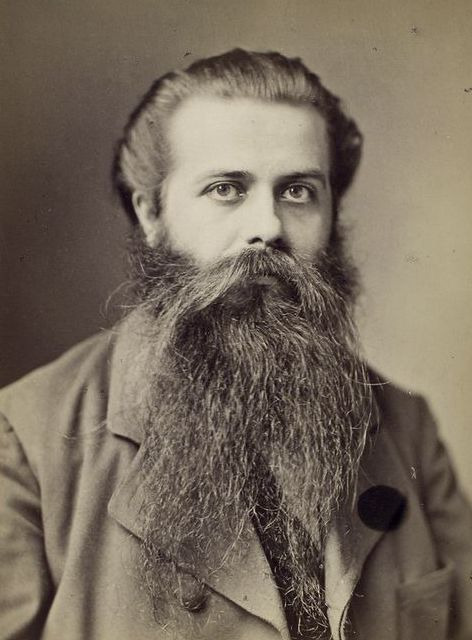
German philosopher who sought to synthesize the thought of Schelling, Hegel, and Schopenhauer. The most important of his fifteen books was Philosophie des Unbewussten (Philosophy of the Unconscious, 1869). For Hartmann both will and idea are interrelated and are expressions of an absolute “thing-in-itself,” the unconscious. The unconscious is the active essence in natural and psychic processes and is the teleological dynamic in organic life. Paradoxically, he claimed that the teleology immanent in the world order and the life process leads to insight into the irrationality of the “will-to-live.” The maturation of rational consciousness would, he held, lead to the negation of the total volitional process and the entire world process would cease. Ideas indicate the “what” of existence and constitute, along with will and the unconscious, the three modes of being. Despite its pessimism, this work enjoyed considerable popularity.
Hartmann was an unusual combination of speculative idealist and philosopher of science (defending vitalism and attacking mechanistic materialism); his pessimistic ethics was part of a cosmic drama of redemption. Some of his later works dealt with a critical form of Darwinism that led him to adopt a positive evolutionary stance that undermined his earlier pessimism. His general philosophical position was selfdescribed as “transcendental realism.” His Philosophy of the Unconscious was translated into English by W. C. Coupland in three volumes in 1884. There is little doubt that his metaphysics of the unconscious prepared the way for Freud’s later theory of the unconscious mind.
See Also:
The Physiological Unconscious
#darwinian unconscious#unconscious#linguistic unconscious#critical theory#the critical tradition#Physiological Unconscious#Philosophy of the Unconscious#German idealism#german romanticism#romanticism#romantic philosophy#will#schopenauer#philosophy of the unconscious#teleology#teleodynamics#mind#Schelling#hegel#georg wilhelm friedrich hegel#darwin as master of suspicion#darwinian unconcious#transcendental realism#Eduard von Hartmann#philosophy#philosophy of science#philosophy of mind#Sigmund Freud#freud#freudian
2 notes
·
View notes
Text
Hegel makes the same point, more prosaically, in The Spirit of Christianity: our “European intellectualism . . . extracts all spirit from the contents of consciousness and crystallizes the latter into absolute objectivities, into realities downright opposed to spirit”; whereas the Greeks conceived “the modifications of nature” as “relationships of life,” our tradition has “objectified” this life, turning it into an “object, . . . a cut-and-dried fact,” it has “crystallized the modifications of nature, the relationships of life, into mundane realities."
Hegel's Phenomenology of Spirit
Mike Forster
3 notes
·
View notes
Text
Are Women in Rock Also Women in Romanticism?
Are Women in Rock Also Women in Romanticism?
So we must speak of Romanticisms in music as well, not just Romanticism, and the individuality of the composer is key. Romanticism in all of its forms is a feature of the subject, not the object, leading to our familiar emphasis on the genius of the composer parallel to the ecstatic, transfigured position of the poet in Coleridge’s “Kubla Khan” or the sensitive, reflective poet of Wordsworth’s…

View On WordPress
#British Romanticism#German Romanticism#hoffmann#instrumental music#Music#Romanticism#schelling#schopenhauer#women in rock#Women in Romanticism
4 notes
·
View notes
Text
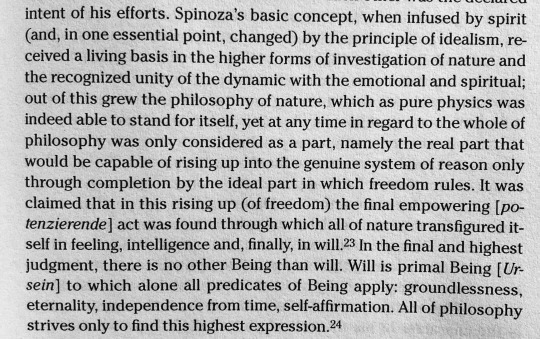
F. W. J. Schelling, Essay on the Essence of Human Freedom (31 March 1809)
4 notes
·
View notes
Text
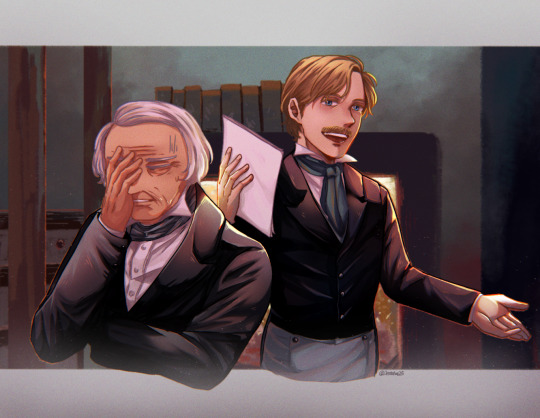
Friedrich Wilhelm Joseph von Schelling met Friedrich Engels (21), author of Anti-Schelling.
.
Inspired by fictional scene from Flug Des Falken (1985), TV series about young Engels' biography.
#friedrich engels#historical figures#art#communism#marxism#artwork#fan art#digital art#schelling#philosophy#philosopher#digital painting#painting#politics
9 notes
·
View notes
Text

This autographed photo shows that Composer and pianist Ernest Schelling (1878-1939). He made his first appearance at the age of four. Since 1924 he continued with the "Young People Concerts" of the New York Philharmonic for the enthusiasm of children and youth for the music. He gave concerts for musicians in need and promotional making American music known in Europe and helping many European musicians get started in America. Enrique Granados was one of his favorites. The most famous work by Schelling is "A Victory Ball", which is mentioned on the autograph.
#Ernest Schelling#Schelling#pianist#piano#composer#classical composer#conductor#Conducting#music director#music#classical music#music history#director#classical#classical studies#Symphony#Orchestra#Academy of Music#symphonic poem#poem#New York Philharmonic Orchestra#electrical recording#recording#recording of the music#Victor Talking Machine Company#Ernest Henry Schelling
2 notes
·
View notes
Text
German and Austrian contemporaries of Napoleon (plus one by Émile Zola in his essay about Stendhal, a French contemporary):
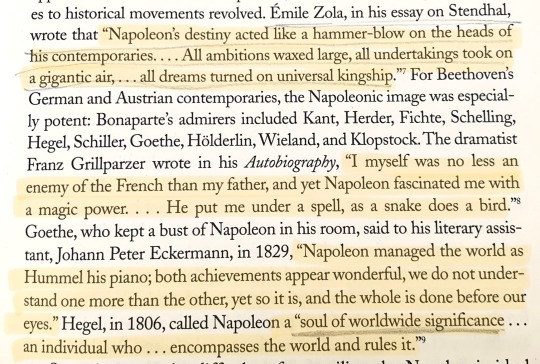
Source: Beethoven, by Maynard Solomon
#napoleon#quotes#book#book pic#napoleonic era#napoleonic#first french empire#french empire#napoleon bonaparte#Kant#herder#Fichte#schelling#Hegel#Schiller#Goethe#friedrich hölderlin#hölderlin#wieland#klopstock#grillparzer#franz grillparzer#émile zola#Zola#Stendhal#Beethoven#france#history#frev#immanuel kant
20 notes
·
View notes
Text
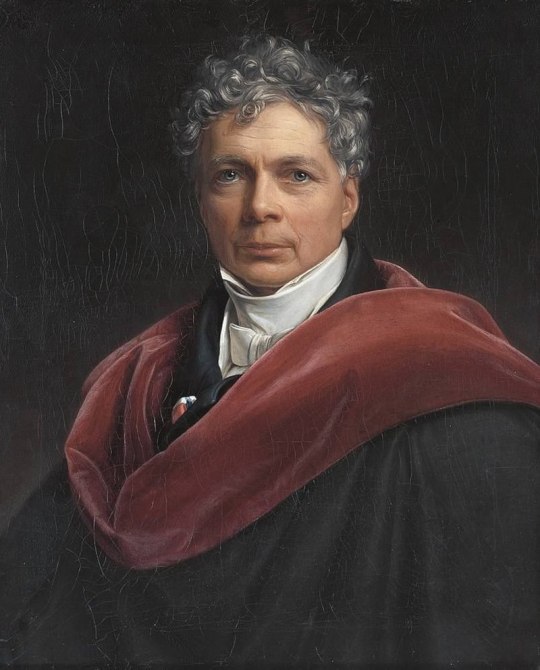
«Entretanto, ¡me he convertido en spinozista! No te asombres. Pronto sabrás en qué sentido: para Spinoza el mundo (el objeto simplemente en oposición frente al sujeto) era todo, para mí es el Yo. La diferencia más propia entre la filosofía crítica y la dogmática me parece que reside en que aquella toma al Yo absoluto (aún no condicionado por objeto alguno) como punto de partida, y esta, al objeto absoluto o No-Yo. La última, en su máxima consecuencia, conduce al sistema de Spinoza, y la primera, al sistema kantiano. La filosofía tiene que partir de lo incondicionado. Pero entonces surge la pregunta, ¿dónde radica este incondicionado, en el Yo o en el No-Yo? Una vez resuelta esta pregunta, todo queda resuelto. Para mí, el principio supremo de la filosofía es el Yo puro o absoluto, es decir, el Yo en cuanto no es más que Yo, que aún no está condicionado en modo alguno por los objetos, sino que es puesto por la libertad. El alfa y omega de toda filosofía es la libertad.»
Friedrich Wilhelm Joseph von Schelling: «De Schelling a Hegel en Berna – 4 de febrero de 1795», en Correspondencia: Kant, Fichte, Schelling, Hegel (Jorge Aurelio Díaz, ed.). Universidad Nacional de Colombia, pág. 307. Bogotá, 2011.
TGO
@bocadosdefilosofia
#schelling#friedrich wilhelm joseph von schelling#correspondencia#kant#fichte#hegel#spinoza#spinozismo#filosofía#filosofía crítica#filosofía dogmática#criticismo#idealismo#idealismo alemán#sistema kantiano#yo#no-yo#yo puro#yo absoluto#libertad#incondicionado#lo incondicionado#objeto#objetos#principio supremo de la filosofía#absoluto#teo gómez otero#joseph karl stieler
5 notes
·
View notes
Text
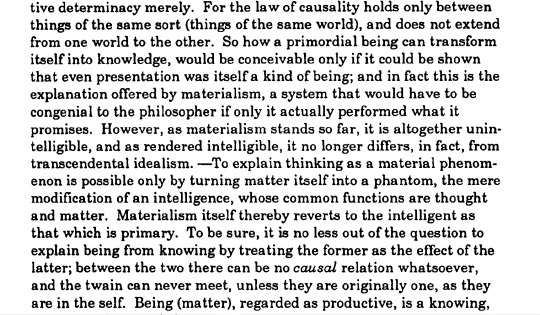
-- Schelling. (1800). System of Transcendental Idealism. p. 57.
2 notes
·
View notes